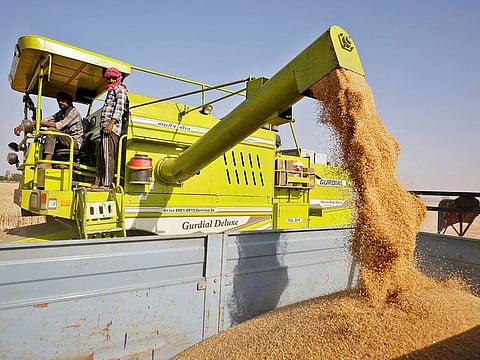India in talks with Egypt, China, others to export wheat
Country's export of wheat recorded a huge surge at $1,742m during April-January 2021-22

New Delhi: India is in talks with countries like Egypt, Turkey, China, Bosnia, Sudan, Nigeria, Iran and other countries beyond its Asian and South Asian neighbours, to export wheat.
According to the Ministry of Commerce and Industry, India is in final talks to start wheat export to Egypt, while discussions are going on with countries like Turkey, China, Bosnia, Sudan, Nigeria, Iran and others to start wheat export.
The export of wheat recorded a huge surge at $1,742 million during April-January 2021-22, growing 387 per cent over the corresponding period in 2020-21 when it touched $340.17 million.
India has reported a wheat export worth $2,352.22 million in the last three years, including the first ten months of the current fiscal 2021-22. In 2019-20, the wheat export was worth $61.84 million which rose to $549.67 million in 2020-21.
Reaching new markets worldwide
Though India is not among the top ten wheat exporters in the global trade, its rate of growth in exports has surpassed that of other countries, indicating the rapid strides it is taking in reaching new markets worldwide.
India's wheat exports are mainly to neighbouring countries with Bangladesh having the largest share of more than 54 per cent in both volume and value terms in 2020-21. In 2020-21, India entered new wheat markets such as Yemen, Afghanistan, Qatar and Indonesia.
Earlier on Thursday, the Agricultural and Processed Food Products Export Development Authority (APEDA) organized a meeting of key stakeholders in the value chain for promoting exports to those countries which have a huge shipment potential.
The meeting followed directions from the Ministry of Commerce and Industry to scale up shipments in order to alleviate any global supply chain disruptions in view of the geopolitical situation.
The meeting witnessed the participation of key stakeholders such as traders, exporters, port officials, policy influencers from the Ministries of Food and Consumer Affairs, Railways and officials from various State governments.
At the meeting, the Railways assured to make available sufficient rakes to meet any immediate demand for additional wheat transport. Port authorities have also been asked to augment dedicated terminals along with dedicated containers for wheat.
Hassle-free export
Given the bumper wheat production estimation, the APEDA asked all stakeholders to strengthen its infrastructure for facilitating hassle-free wheat export.
According to data by the Directorate General of Commercial Intelligence and Statistics (DGCIS), the top ten importing countries for Indian wheat in 2020-21 were Bangladesh, Nepal, United Arab Emirates, Sri Lanka, Yemen, Afghanistan, Qatar, Indonesia, Oman and Malaysia. The top ten countries accounted for more than 99 per cent share in India's wheat exports in 2020-21 in both volume and value terms.
"We are giving thrust on building infrastructure in the value chain for giving boosts to cereal exports in collaboration with the state governments and other stakeholders such as exporters, farmer producer organizations, transporters etc," said M Angamuthu, Chairman, APEDA.
Second-largest producer
According to the Ministry of Commerce and Industry, India accounts for even less than one per cent of world wheat export. However, its share has increased from 0.14 per cent in 2016 to 0.54 per cent in 2020. India is the second-largest producer of wheat with a share of around 14.14 per cent of world total production in 2020.
India produces around 107.59 Million MT of wheat annually while a major chunk of it goes towards domestic consumption. Major wheat growing states in India are Uttar Pradesh, Punjab, Haryana, Madhya Pradesh, Rajasthan, Bihar and Gujarat.
The unit price of wheat plays an important role in international trade. While the unit export price of wheat has increased for all countries in the last five years, India's unit export price is slightly higher than that of other countries. This is one of the factors adversely impacting wheat exports from India.
APEDA has been focusing on facilitating shipments by Indian exporters and helping them make inroads into new markets. In order to ensure seamless quality certification of products to be exported, APEDA has recognized 220 labs across India to provide testing services for a wide range of products and exporters.
APEDA also assists in upgradation and strengthening of recognized laboratories for export testing and residue monitoring plans. APEDA also provides assistance under the financial assistance schemes of infrastructure development, quality improvement and market development for boosting the export of agricultural products.
Sign up for the Daily Briefing
Get the latest news and updates straight to your inbox


